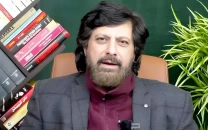Why sacrifice Shahrukh to promote Shaan?
Chennai Express and Once Upon a Time in Mumbaai 2 banned on Eid to foster release of four Pakistani flicks.

The four Pakistani films should get more visibility, say exhibitors. DESIGN : MAHA HAIDER
For the Pakistani cinema, the days have been dark for far too long. Fortunately, this fragile industry with tremendous potential is finally gearing up to deliver. Bolts have been tightened and hinges oiled, with the industry finally bracing itself for the release of four Pakistani films after a two-year hiatus: Waar, Main Hoon Shahid Afridi, Ishq Khuda and Josh are all set for release this Eid.
For this reason, distributors and exhibitors in Pakistan have decided to abandon Shahrukh Khan-starrer Chennai Express and Akshay Kumar-starrer Once Upon a Time in Mumbaai 2 -— films which are slated to release worldwide around Eid. The reason cited by the exhibitors is that Pakistani film-makers want all four local films to get more visibility.
Now here’s the problem: by applying a protectionist cultural policy, are we not robbing the Pakistani market of healthy competition? Even if the ban lasts a couple of weeks, we are temporarily relieving ourselves of a much better competition that is going to give us a tough time in the long run. The situation reminds us of the pigeon that closed its eyes to block out the cat that was coming to eat it.
Producers understandably feel that none of our films can compete with the production of value of films like Chennai Express. But what stakeholders tend to overlook is the Pakistani audience’s loyalty to local content. In the past, we saw Shoaib Mansoor’s Khuda Kay Liye gave a tough time to Emraan Hashmi-starrer Awarapan; while Mansoor’s second flick Bol, outclassed every other film at the local box office on its release.
Such examples render the insecurity of local film-makers misplaced and selfish. If the release of Bollywood films carries on as per schedule, it will help the audience and stakeholders gauge the value and quality of Pakistani films. If a Pakistani film manages to beat a mainstream Bollywood film at the box office, it will be a huge achievement for our film industry, without hurting the Indian film industry at all.
Another point to note is the release dates of Waar, Main Hoon Shahid Afridi, Ishq Khuda and Josh, which have been postponed in the past. If due to further delays in the production or editing, these films are not released on Eid, exhibitors will have to face major losses since the Indian films will not be available.
A similar incident occurred in 2010, when a Syed Noor-led delegation got Indian films banned on Eid by the cultural ministry and promised the release of three Pakistani films. But Eid came and went, and no Pakistani film was released. As a result of this, a mainstream film like Dabangg made it to Pakistani cinemas three days later than its worldwide release — after cable operators had run pirated versions of throughout the holidays. This was one of the worst post-Ramazan box office failures, which could be repeated if there are more delays at our end.
In a debate like this, the decision of actor-turned-film-maker Reema Khan to release her first production venture Love Mein Ghum alongside Salman Khan-starrer Bodyguard should be lauded. Despite being a box office flop, Love Mein Ghum’s release spoke volumes for the effort Reema made to put her film at par with an Indian flick.
The practice of airing Turkish soaps during primetime and screening Indian films on Eid shows how having a healthy competition ups the quality of content produced. Banning or prohibiting foreign content temporarily might be profitable for some, but is essentially unhealthy in the long run.
Shahrukh and Kumar should not be eliminated from the competition this Eid, but instead should be available along with Shaan Shahid and Humayun Saeed. Let’s show some confidence in our entertainers and allow our audience to show its loyalty towards local faces versus Bollywood ones.
Published in The Express Tribune, May 2nd, 2013.
Like Life & Style on Facebook for the latest in fashion, gossip and entertainment.



















COMMENTS
Comments are moderated and generally will be posted if they are on-topic and not abusive.
For more information, please see our Comments FAQ